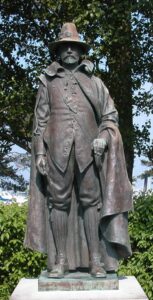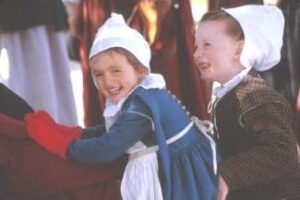 In the spring of 1624, the Pilgrims realized that changing the “common course and condition” (communal farming) to a private initiative where each family was responsible to produce its own corn was wise. Bradford writes, “…Having found the benefit of last year’s harvest, and setting corn for their particular, having thereby with a great deal of patience overcome hunger and famine.” As peaceful as this appears, their prosperity was tested by a series of challenges.
In the spring of 1624, the Pilgrims realized that changing the “common course and condition” (communal farming) to a private initiative where each family was responsible to produce its own corn was wise. Bradford writes, “…Having found the benefit of last year’s harvest, and setting corn for their particular, having thereby with a great deal of patience overcome hunger and famine.” As peaceful as this appears, their prosperity was tested by a series of challenges.
The ship Charity arrived in March of 1624. Bradford writes that Edward Winslow got the Adventurers to bring supplies procured by the efforts of John Robinson, their pastor. This ship had “three heifers and a bull, the first beginning of any cattle of that kind in the land, with some clothing and other necessaries… but withal the report of a strong faction amongst the Adventurers against them, and especially against the coming of the rest from Leyden.” Faction would be the challenge of 1624!
A letter written by James Sherley, business partner for the Pilgrims in England, listed accusations being “made by some of those that came over on their Particular and were returned home.” These individuals had returned with supplies to help retire their debt, but also gave a bad report of the Pilgrims who had actually treated them so well! Have you ever been falsely accused? 1st Peter 4:13-16 gives us instructions on how to glorify God while being falsely accused, for the way we answer such accusations can reveal our character!
 Below, I have highlighted select objections and answers as Bradford wrote them (with my comments included in parentheses):
Below, I have highlighted select objections and answers as Bradford wrote them (with my comments included in parentheses):
1st objection was diversity of religion. Answer: We know no such matter, for here was never any controversy or opposition, either public or private (to our knowledge) since we came. (Those who were in Plymouth were mostly Separatists who were reformed after the tradition of Calvinists. They were naturally desiring to be equally yoked in their worship; see 2nd Corinthians 6:14-15.)
2nd obj.: Neglect of family duties on the Lord’s Day. Ans.: We allow no such thing, but blame it in ourselves and others, and they that thus report it should have showed their Christian love the more if they had in love told the offenders of it, rather than thus to reproach them behind their backs. But (to say no more) we wish themselves had given better example. (The Scriptures exhort us to refrain from gossip and slander in Exodus 23:1 and Ephesians 4:29. People would rather accuse behind the scenes than answer for falsehood face to face.)
3rd obj.: Want of both the sacraments. Ans.: The more is our grief, that our pastor is kept from us, by whom we might enjoy them; for we used to have the Lord’s Supper every Sabbath, and baptism as often as there was occasion of children to baptize. (The Pilgrims allowed only ordained ministers to administer communion or baptism, as Robinson interpreted Romans 12:7-8 and 1st Timothy 5:17 in a letter to William Brewster on this topic.)
 4th obj.: Children not catechized nor taught to read. Ans.: Neither is true, for divers take pains with their own as they can. Indeed, we have no common school for want of a fit person, or hitherto means to maintain one; though we desire now to begin. (The primary educator for the Pilgrims was the parent, particularly the mother, at home, and the numbers of books and catechisms, together with evidence that the wife of Samuel Fuller may have conducted a dame school for parents unable to teach, makes Bradford’s response quite accurate.)
4th obj.: Children not catechized nor taught to read. Ans.: Neither is true, for divers take pains with their own as they can. Indeed, we have no common school for want of a fit person, or hitherto means to maintain one; though we desire now to begin. (The primary educator for the Pilgrims was the parent, particularly the mother, at home, and the numbers of books and catechisms, together with evidence that the wife of Samuel Fuller may have conducted a dame school for parents unable to teach, makes Bradford’s response quite accurate.)
5th obj.: Many of the Particular members of the plantation will not work for the General. Ans.: This also is not wholly true, for though some do it not willingly, and others not honestly, yet all do it; and he that doth worst gets his own food and something besides. But we will not excuse them, but labour to reform them the best we can; or else to quit the Plantation of them. (The Bible tells us that the faults we see in others we are blind to in ourselves – Romans 2:1.)
6th obj.: The water is not wholesome. Ans.: If they mean, not so wholesome as the good beer and wine in London (which they so dearly love), we will not dispute with them; but else for water it is as good as any in the world (for aught we know) and it is wholesome enough to us that can be content therewith. (In Morrison’s footnote, he writes, “William Wood in New England’s Prospect (1634) pays another tribute to New England water: ‘Those that drink it be as healthful, fresh and lusty as they that drink beer.’” Often complaints from many major in the minors. On another note, it is worth mentioning that the alcoholic content of the beer then is much less than today.)
9th obj.: Many of them are thievish and steal one from another. Ans.: Would London had been free from that crime, then we should not have been troubled with these here. It is well known sundry have smarted well for it, and so are the rest like to do, if they be taken. (The sinful nature of man is everywhere, and thus it is not whether there be sin, but how it is dealt with.)
10th obj.: The country is annoyed with foxes and wolves. Ans.: So are many other good countries, too; but poison, traps and other such means will help to destroy them. (Some always complain, deviating from the main mission. We are exhorted otherwise in Philippians 2:14-16.)
11th obj.: The Dutch are planted near Hudson’s Bay and are likely to overthrow the trade. Ans.: They will come and plant in these parts, also, if we and others do not, but go home and leave it to them. We rather commend them than condemn them for it. (Bradford uses clear Biblical wisdom here, for there is no use in creating a larger challenge than really exists, like those who wanted to reprove others who were doing God’s work but not among the disciples. They were creating a challenge that did not exist, and Jesus rebuked them for it – Luke 9:49-50.)
 12th obj.: The people are much annoyed with mosquitoes. Ans.: They are too delicate and unfit to begin new plantations and colonies, that cannot endure the biting of a mosquito. We would wish such to keep at home till at least they be mosquito-proof. Yet this place is as free as any, and experience teacheth that the more the land is tilled, and the woods cut down, the fewer there will be, and in the end scarce any at all. (The Bible warns against being faint of heart and exhorts us to “be strong, do not fear!” – Isaiah 35:4.)
12th obj.: The people are much annoyed with mosquitoes. Ans.: They are too delicate and unfit to begin new plantations and colonies, that cannot endure the biting of a mosquito. We would wish such to keep at home till at least they be mosquito-proof. Yet this place is as free as any, and experience teacheth that the more the land is tilled, and the woods cut down, the fewer there will be, and in the end scarce any at all. (The Bible warns against being faint of heart and exhorts us to “be strong, do not fear!” – Isaiah 35:4.)
Accusations and objections often reveal details about what we believe and practice. It is often said that without false doctrine challenging the faith in the centuries following Christ, we would not have had the apologetics and clarity about what the Bible teaches. So it is in life; let us not chafe at those who disagree or even accuse, but with wisdom and clarity, we can use it for good, bringing greater clarity!







